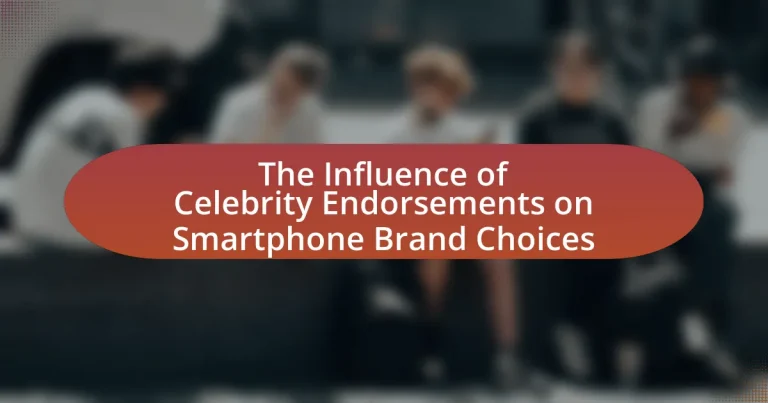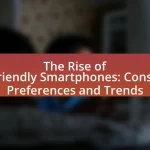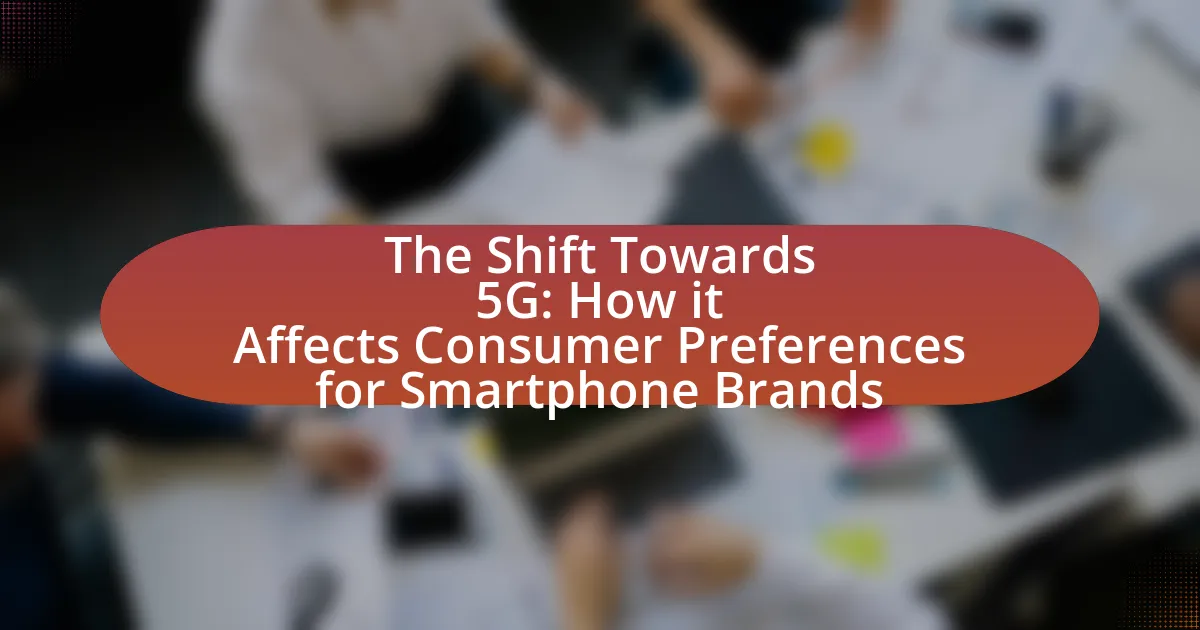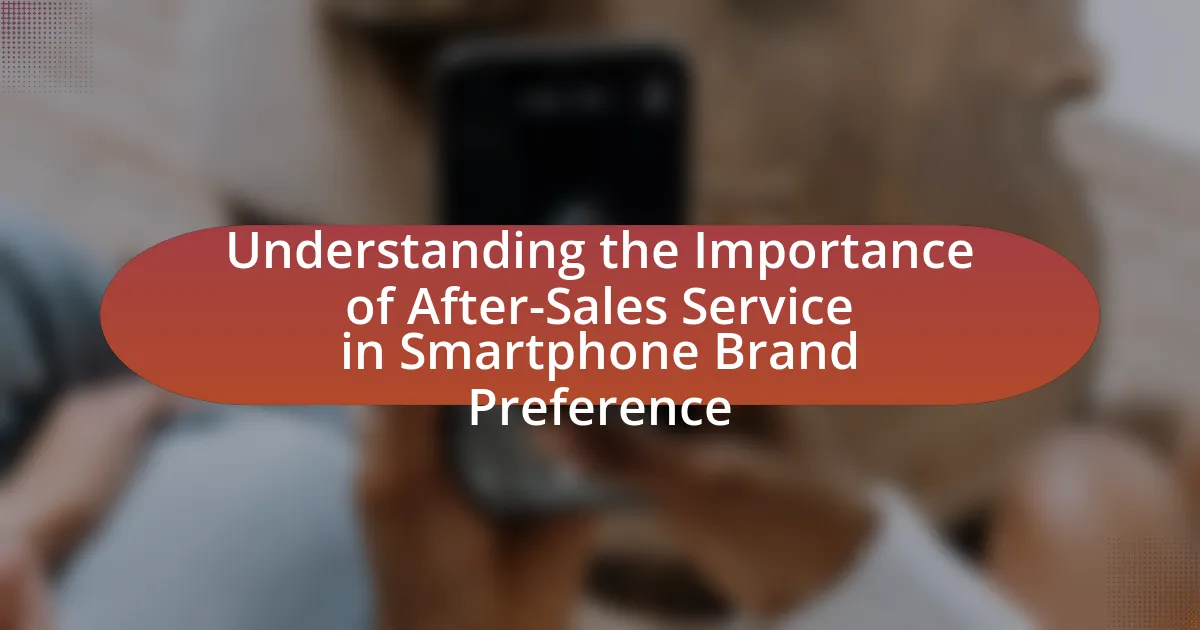The article examines the influence of celebrity endorsements on smartphone brand choices, highlighting how these endorsements enhance brand visibility and credibility. Research indicates that consumers, particularly younger demographics, are more likely to purchase smartphones endorsed by admired celebrities, as these endorsements create perceptions of quality and desirability. The article explores the psychological mechanisms behind this influence, the impact on consumer perception and brand image, and the factors that brands consider when selecting celebrities for endorsements. Additionally, it addresses the potential risks associated with celebrity endorsements and how demographic factors, such as age and gender, affect consumer responses. Finally, the article outlines strategies for brands to maximize the effectiveness of celebrity endorsements in their marketing campaigns.
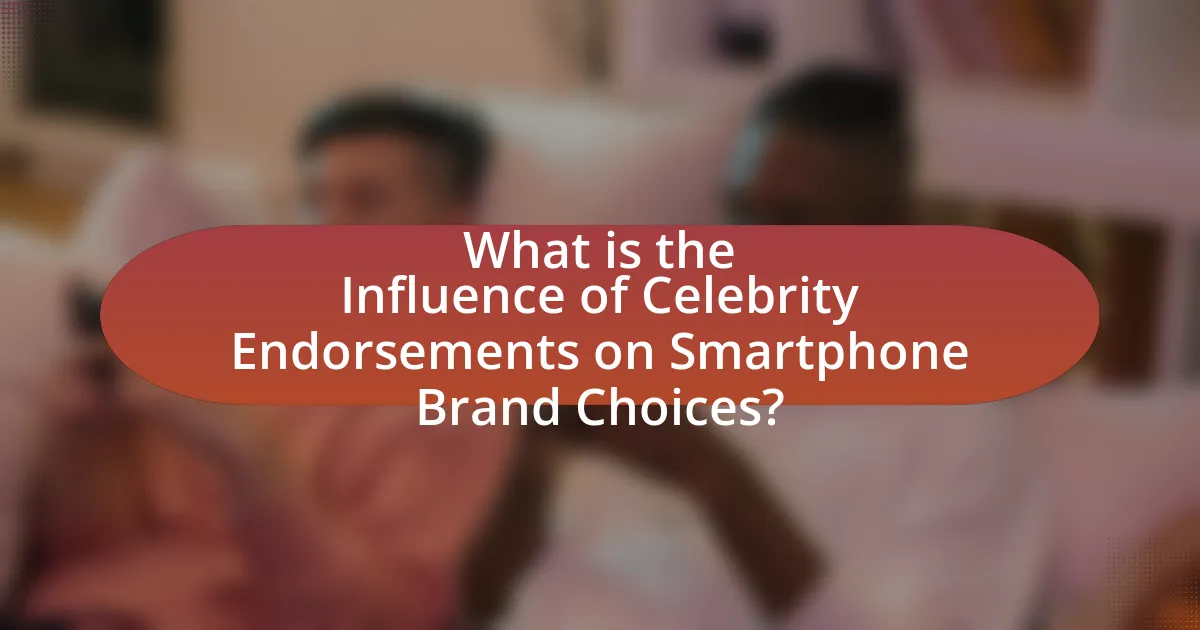
What is the Influence of Celebrity Endorsements on Smartphone Brand Choices?
Celebrity endorsements significantly influence smartphone brand choices by enhancing brand visibility and credibility. Research indicates that consumers are more likely to purchase smartphones endorsed by celebrities they admire, as these endorsements create a perception of quality and desirability. For instance, a study published in the Journal of Advertising Research found that 70% of consumers reported being influenced by celebrity endorsements when making purchasing decisions. This effect is particularly pronounced among younger demographics, who often view celebrities as trendsetters. Thus, the strategic use of celebrity endorsements can lead to increased brand loyalty and higher sales for smartphone manufacturers.
How do celebrity endorsements impact consumer perception of smartphone brands?
Celebrity endorsements significantly enhance consumer perception of smartphone brands by leveraging the trust and admiration that consumers have for the celebrities. Research indicates that when a well-known figure endorses a smartphone brand, it can lead to increased brand awareness and a positive brand image. For instance, a study published in the Journal of Advertising Research found that 67% of consumers are more likely to purchase a product endorsed by a celebrity they admire, highlighting the effectiveness of such endorsements in shaping consumer attitudes. Additionally, the perceived credibility of the celebrity can transfer to the brand, making consumers more likely to view the smartphone as high-quality and desirable.
What psychological mechanisms are involved in celebrity endorsements?
Celebrity endorsements leverage several psychological mechanisms, including social proof, credibility, and emotional appeal. Social proof occurs when consumers observe others, particularly influential figures, endorsing a product, leading them to believe that the product is desirable and trustworthy. Credibility is established through the perceived expertise and trustworthiness of the celebrity, which can enhance the brand’s image and influence consumer attitudes. Emotional appeal is generated by the connection consumers feel towards the celebrity, often evoking feelings of admiration or aspiration, which can drive purchasing decisions. Research indicates that consumers are more likely to choose brands endorsed by celebrities they admire, as demonstrated in studies showing increased purchase intentions when a celebrity aligns with the brand’s values and image.
How does brand image change with celebrity endorsements?
Celebrity endorsements significantly enhance brand image by associating products with the positive attributes of the celebrity. This association can lead to increased brand recognition, perceived quality, and consumer trust. For instance, a study published in the Journal of Advertising Research found that brands endorsed by celebrities experienced a 20% increase in consumer purchase intent compared to those without endorsements. This demonstrates that the credibility and popularity of the celebrity can effectively elevate the brand’s status in the eyes of consumers, ultimately influencing their smartphone choices.
Why do brands choose celebrities for endorsements?
Brands choose celebrities for endorsements primarily to leverage their influence and reach, which can significantly enhance brand visibility and credibility. Celebrities often have large, dedicated followings, allowing brands to tap into these audiences and create a stronger emotional connection with potential customers. For instance, a study published in the Journal of Advertising Research found that celebrity endorsements can increase purchase intentions by up to 20%. This effectiveness stems from the perceived trustworthiness and aspirational qualities associated with celebrities, making consumers more likely to choose products they endorse.
What factors influence the selection of a celebrity for a smartphone brand?
The selection of a celebrity for a smartphone brand is influenced by factors such as brand alignment, target audience appeal, and the celebrity’s public image. Brand alignment ensures that the celebrity’s values and lifestyle resonate with the smartphone’s brand identity, enhancing authenticity. Target audience appeal is crucial, as brands often choose celebrities who can effectively reach and engage their desired demographic, increasing the likelihood of consumer connection. The celebrity’s public image, including their reputation and social media presence, also plays a significant role; a positive image can enhance brand perception and trust. For instance, a study by the Journal of Advertising Research found that celebrities with high credibility can significantly boost brand attitudes and purchase intentions among consumers.
How does the celebrity’s image align with the brand’s values?
The celebrity’s image aligns with the brand’s values by embodying innovation, style, and social responsibility, which are core principles of the smartphone brand. For instance, if the celebrity is known for their commitment to sustainability and cutting-edge technology, this directly reflects the brand’s mission to produce eco-friendly devices with advanced features. This alignment is further validated by the brand’s marketing campaigns that highlight the celebrity’s advocacy for environmental issues, reinforcing the connection between their public persona and the brand’s ethical stance.
What are the potential risks of celebrity endorsements for smartphone brands?
Celebrity endorsements for smartphone brands carry several potential risks, including brand reputation damage, consumer skepticism, and misalignment with target audiences. If a celebrity becomes involved in a scandal, the associated smartphone brand may suffer reputational harm, as seen with brands like Samsung during controversies involving their endorsers. Additionally, consumers may become skeptical of the authenticity of the endorsement, leading to decreased trust in the brand; a study by the Journal of Advertising Research found that 61% of consumers are wary of celebrity endorsements due to perceived insincerity. Lastly, if the celebrity does not resonate with the brand’s target demographic, the endorsement may fail to connect with potential customers, resulting in wasted marketing resources and ineffective campaigns.
How can negative publicity surrounding a celebrity affect brand choices?
Negative publicity surrounding a celebrity can significantly impact brand choices by diminishing consumer trust and altering brand perception. When a celebrity associated with a brand faces negative media attention, studies show that consumers often distance themselves from the brand to avoid association with the controversy. For instance, a survey by the American Marketing Association found that 60% of consumers would reconsider purchasing a product endorsed by a celebrity involved in a scandal. This shift in consumer sentiment can lead to decreased sales and a tarnished brand image, as brands are often perceived through the lens of their endorsers’ actions.
What happens when a celebrity’s image conflicts with brand messaging?
When a celebrity’s image conflicts with brand messaging, it can lead to a significant negative impact on the brand’s reputation and consumer trust. This misalignment often results in decreased sales, as consumers may feel that the brand does not reflect their values or beliefs. For instance, a study published in the Journal of Advertising Research found that when a celebrity endorses a product that contradicts their public persona, it can lead to a 30% drop in purchase intent among consumers. This demonstrates that the effectiveness of celebrity endorsements is heavily reliant on the alignment between the celebrity’s image and the brand’s messaging.
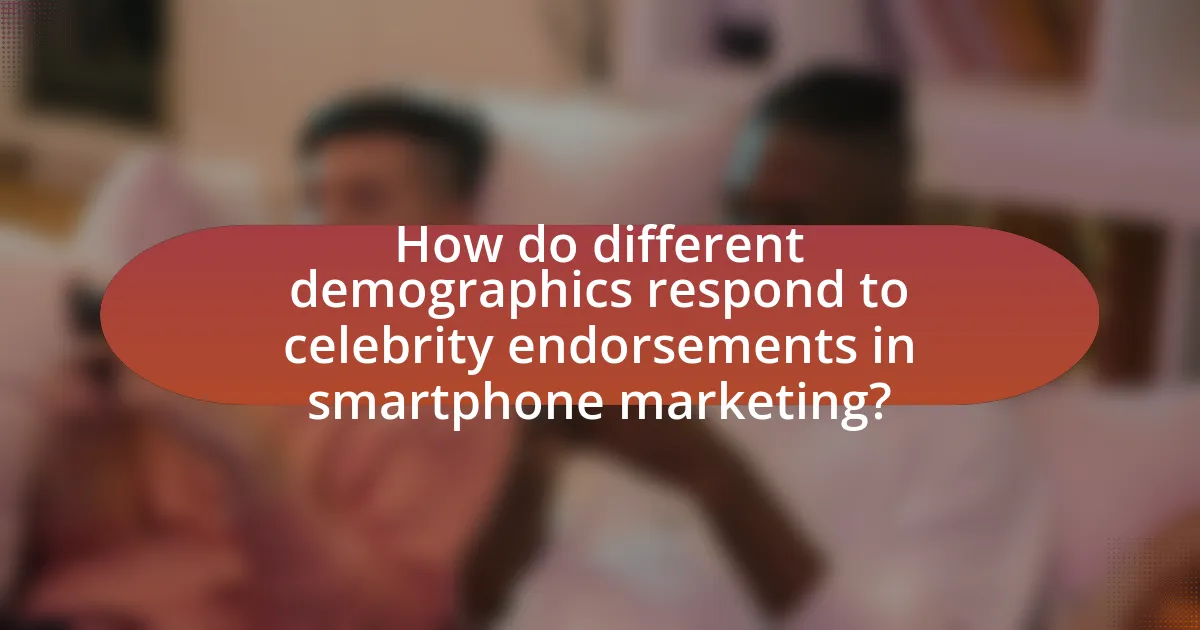
How do different demographics respond to celebrity endorsements in smartphone marketing?
Different demographics respond variably to celebrity endorsements in smartphone marketing, influenced by factors such as age, gender, and cultural background. For instance, younger consumers, particularly those aged 18-24, tend to be more receptive to endorsements from celebrities, as they often view these figures as trendsetters and sources of inspiration. Research by the American Marketing Association indicates that 70% of millennials are influenced by celebrity endorsements when making purchasing decisions. In contrast, older demographics, such as those over 50, may prioritize product functionality and reliability over celebrity influence, resulting in a lower response rate to endorsements. Gender also plays a role; studies show that women are more likely to respond positively to endorsements from female celebrities, while men may respond similarly to male celebrities. This demographic variability highlights the importance of tailoring marketing strategies to align with the specific preferences and values of different consumer groups.
What role does age play in the effectiveness of celebrity endorsements?
Age significantly influences the effectiveness of celebrity endorsements, as different age groups respond variably to celebrity appeal. Research indicates that younger consumers, particularly those aged 18 to 34, are more likely to be influenced by celebrity endorsements due to their higher engagement with social media and pop culture, which often features these celebrities prominently. In contrast, older consumers, typically over 50, may prioritize trustworthiness and expertise over celebrity status, leading to a diminished impact of endorsements on their purchasing decisions. A study published in the Journal of Advertising Research found that 70% of millennials reported being influenced by celebrity endorsements, while only 30% of seniors felt the same way, highlighting the disparity in effectiveness across age demographics.
How do younger consumers perceive celebrity endorsements compared to older consumers?
Younger consumers generally perceive celebrity endorsements as more influential and relatable compared to older consumers. Research indicates that younger demographics, particularly Millennials and Gen Z, are more likely to trust and engage with brands endorsed by celebrities, viewing them as authentic and aspirational figures. In contrast, older consumers tend to be more skeptical of celebrity endorsements, often questioning the authenticity and relevance of the celebrity’s connection to the product. A study published in the Journal of Advertising Research found that 70% of younger consumers reported feeling a stronger connection to brands that utilize celebrity endorsements, while only 40% of older consumers expressed similar sentiments. This difference in perception highlights the varying levels of trust and engagement across age groups regarding celebrity influence in marketing.
What are the differences in brand loyalty among various age groups influenced by celebrity endorsements?
Brand loyalty influenced by celebrity endorsements varies significantly across age groups. Younger consumers, particularly those aged 18-24, exhibit higher brand loyalty when endorsed by celebrities, as they often identify with the lifestyle and values represented by these figures. In contrast, consumers aged 35 and older tend to be more skeptical of celebrity endorsements, relying instead on product quality and peer recommendations. Research indicates that 70% of millennials are more likely to purchase a product endorsed by a celebrity they admire, while only 30% of older generations express similar sentiments. This disparity highlights the generational differences in how celebrity influence shapes brand loyalty, with younger demographics being more susceptible to the allure of celebrity endorsements.
How does gender influence the effectiveness of celebrity endorsements in smartphone choices?
Gender significantly influences the effectiveness of celebrity endorsements in smartphone choices, as research indicates that male and female consumers respond differently to endorsements based on perceived credibility and relatability of the celebrity. For instance, a study published in the Journal of Advertising Research found that female consumers are more likely to be influenced by endorsements from female celebrities, as they perceive them as more relatable and trustworthy, while male consumers tend to respond positively to endorsements from male celebrities who exhibit traits of confidence and authority. This gender-based difference in response can be attributed to social and psychological factors, such as the desire for identification and aspirational qualities in the endorsed products.
What types of celebrities resonate more with male consumers versus female consumers?
Male consumers tend to resonate more with athletes and action-oriented celebrities, while female consumers are more influenced by fashion icons and entertainers. Research indicates that male consumers often prefer endorsements from male athletes, as they associate these figures with strength and performance, which aligns with their interests in technology and gadgets. Conversely, female consumers are more likely to respond positively to endorsements from female celebrities in fashion and beauty, as these figures represent aspirational lifestyles and trends. A study published in the Journal of Advertising Research found that 70% of female respondents favored endorsements from fashion influencers, while 65% of male respondents preferred endorsements from sports figures, highlighting the distinct preferences between genders in celebrity endorsements.
How do gender stereotypes affect the perception of celebrity endorsements?
Gender stereotypes significantly influence the perception of celebrity endorsements by shaping consumer expectations and attitudes towards products. For instance, female celebrities are often associated with beauty and emotional appeal, leading consumers to perceive endorsed products as more suitable for personal care or fashion, while male celebrities are frequently linked to strength and reliability, affecting perceptions of technology or automotive products. Research by the American Psychological Association indicates that these stereotypes can lead to biased evaluations of endorsements, where consumers may trust or relate to a celebrity based on their alignment with traditional gender roles. This alignment can enhance the effectiveness of the endorsement, as consumers are more likely to engage with brands that resonate with their preconceived notions of gender.
What cultural factors impact the effectiveness of celebrity endorsements in different regions?
Cultural factors significantly impact the effectiveness of celebrity endorsements across different regions. These factors include societal values, consumer behavior, and local celebrity relevance. For instance, in collectivist cultures, such as those in East Asia, endorsements by celebrities who embody community values resonate more strongly, as consumers prioritize group harmony and social acceptance. Conversely, in individualistic cultures like the United States, personal achievement and individual success are more valued, making endorsements by celebrities who represent personal empowerment more effective. Additionally, the familiarity and relatability of the celebrity to the local audience can enhance the endorsement’s impact; research shows that consumers are more likely to trust and engage with brands endorsed by celebrities who share similar cultural backgrounds or experiences.
How do cultural values shape consumer responses to celebrity endorsements?
Cultural values significantly shape consumer responses to celebrity endorsements by influencing perceptions of credibility, relatability, and aspirational appeal. For instance, in collectivist cultures, consumers may respond more positively to endorsements from celebrities who emphasize community and family values, as seen in markets like Asia where group harmony is prioritized. Conversely, in individualistic cultures, such as the United States, endorsements that highlight personal achievement and self-expression resonate more, as evidenced by the success of celebrity endorsements that focus on personal stories and individual success. Research by McCracken (1989) in “Who is the Celebrity Endorser? Cultural Foundations of the Endorsement Process” supports this by illustrating how cultural context affects the effectiveness of celebrity endorsements, demonstrating that alignment between a celebrity’s image and cultural values enhances consumer trust and purchase intention.
What are the implications of cultural differences for global smartphone brands?
Cultural differences significantly impact global smartphone brands by influencing consumer preferences, marketing strategies, and product features. For instance, brands must adapt their advertising messages to resonate with local values and norms; a campaign that works in one country may fail in another due to differing cultural perceptions. Research indicates that 70% of consumers prefer brands that reflect their cultural identity, highlighting the necessity for tailored marketing approaches. Additionally, product features may need to be customized; for example, camera specifications may be prioritized in cultures where social media sharing is prevalent, such as in Southeast Asia. Thus, understanding and integrating cultural nuances is essential for global smartphone brands to effectively engage diverse markets and enhance brand loyalty.
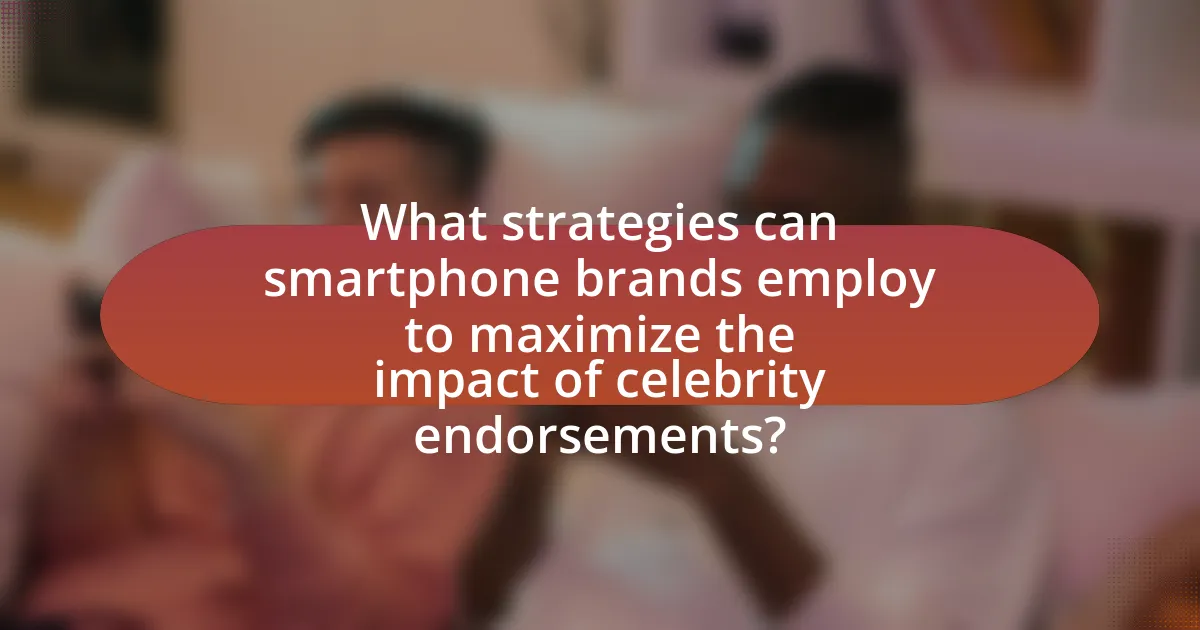
What strategies can smartphone brands employ to maximize the impact of celebrity endorsements?
Smartphone brands can maximize the impact of celebrity endorsements by strategically aligning their brand values with the celebrity’s image and audience. This alignment ensures that the endorsement resonates with the target demographic, enhancing credibility and relatability. For instance, brands like Apple and Samsung have successfully partnered with celebrities who embody innovation and style, thus reinforcing their market positioning. Additionally, leveraging social media platforms for real-time engagement amplifies the reach of endorsements, as seen in campaigns where celebrities share personal experiences with the products, leading to increased consumer trust and purchase intent. Research indicates that endorsements can increase brand recall by up to 20%, demonstrating the effectiveness of these strategies in driving consumer behavior.
How can brands effectively integrate celebrity endorsements into their marketing campaigns?
Brands can effectively integrate celebrity endorsements into their marketing campaigns by aligning the celebrity’s image and values with the brand’s identity and target audience. This alignment ensures authenticity, which is crucial for consumer trust; studies show that 70% of consumers are more likely to trust a brand when they see a celebrity they admire endorsing it. Additionally, brands should leverage social media platforms where the celebrity has a strong following to maximize reach and engagement. For instance, a campaign featuring a celebrity on Instagram can lead to a 10 times higher engagement rate compared to traditional advertising methods. By utilizing these strategies, brands can enhance their visibility and influence consumer purchasing decisions in the smartphone market.
What are the best practices for creating authentic partnerships with celebrities?
The best practices for creating authentic partnerships with celebrities include aligning brand values with the celebrity’s personal brand, ensuring genuine engagement, and fostering long-term relationships. Brands should select celebrities whose values resonate with their target audience, as this alignment enhances credibility and relatability. For instance, a study by the Journal of Advertising Research found that consumers are more likely to trust endorsements from celebrities who share similar values, leading to increased brand loyalty. Additionally, authentic partnerships thrive on genuine interactions, where celebrities actively participate in campaigns rather than merely endorsing products. This approach fosters a sense of authenticity and connection with consumers. Lastly, cultivating long-term relationships rather than one-off endorsements allows brands to build a consistent narrative, reinforcing trust and familiarity over time.
How can brands measure the success of celebrity endorsement campaigns?
Brands can measure the success of celebrity endorsement campaigns through various metrics such as sales growth, brand awareness, and social media engagement. Sales growth can be tracked by comparing sales figures before and after the campaign launch, providing a direct correlation to the endorsement’s impact. Brand awareness can be assessed through surveys and market research, which indicate shifts in consumer recognition and perception of the brand. Social media engagement metrics, including likes, shares, and comments on posts featuring the celebrity, can also serve as indicators of campaign effectiveness, with studies showing that endorsements can increase engagement rates by up to 30%.
What are some examples of successful celebrity endorsements in the smartphone industry?
Successful celebrity endorsements in the smartphone industry include endorsements by celebrities such as LeBron James for Samsung, who promoted the Galaxy series, and Taylor Swift for Apple, particularly highlighting the Apple Music platform. These endorsements have significantly boosted brand visibility and consumer engagement. For instance, Samsung reported a 20% increase in sales during the campaign featuring LeBron James, while Apple saw a surge in subscriptions to Apple Music following Taylor Swift’s promotion.
What lessons can be learned from these successful campaigns?
Successful campaigns utilizing celebrity endorsements demonstrate that authenticity and relatability significantly enhance consumer trust and brand loyalty. Research indicates that consumers are more likely to purchase products endorsed by celebrities they perceive as genuine and relatable, as seen in campaigns featuring personalities like Dwayne Johnson and Selena Gomez, who resonate with diverse audiences. Furthermore, strategic alignment between the celebrity’s image and the brand’s values amplifies the campaign’s effectiveness, evidenced by Apple’s collaboration with celebrities who embody innovation and creativity. These lessons underscore the importance of selecting endorsers who align with the target demographic and brand ethos to maximize impact and drive consumer engagement.
How did these endorsements influence consumer behavior and brand perception?
Celebrity endorsements significantly influence consumer behavior and brand perception by enhancing brand credibility and desirability. When well-known figures endorse a smartphone brand, they create a positive association that can lead to increased consumer trust and a higher likelihood of purchase. Research indicates that 49% of consumers are more likely to purchase a product when it is endorsed by a celebrity they admire, demonstrating the direct impact of endorsements on buying decisions. Furthermore, endorsements can shift brand perception, positioning the endorsed brand as more aspirational and desirable, which is particularly evident in the smartphone market where brand loyalty is crucial.
What practical tips can brands follow to choose the right celebrity for endorsement?
Brands should prioritize alignment between the celebrity’s image and their brand values when selecting a celebrity for endorsement. This alignment ensures authenticity, which is crucial for consumer trust; for instance, a study by the Journal of Advertising Research found that congruence between a celebrity’s persona and the brand’s identity significantly enhances the effectiveness of the endorsement. Additionally, brands should consider the celebrity’s audience reach and engagement levels, as a celebrity with a strong following in the target demographic can amplify brand visibility. Furthermore, analyzing past endorsement successes and failures can provide insights into potential outcomes, as evidenced by the fact that brands like Nike have seen increased sales through strategic partnerships with athletes who resonate with their core audience.
How can brands assess the alignment between a celebrity’s image and their target audience?
Brands can assess the alignment between a celebrity’s image and their target audience by conducting market research that includes surveys, focus groups, and social media analysis. This research helps identify the values, interests, and demographics of the target audience, allowing brands to compare these insights with the celebrity’s public persona and past endorsements. For instance, a study by the Journal of Advertising Research found that 70% of consumers are more likely to purchase a product endorsed by a celebrity who shares similar values and lifestyle preferences. By analyzing engagement metrics and audience sentiment on social media platforms, brands can further gauge how well a celebrity resonates with their intended market, ensuring that the endorsement is authentic and effective.
What tools can brands use to evaluate the potential impact of a celebrity endorsement?
Brands can use tools such as social media analytics, sentiment analysis, and brand lift studies to evaluate the potential impact of a celebrity endorsement. Social media analytics provide insights into engagement metrics, audience reach, and overall brand sentiment before and after the endorsement, allowing brands to measure changes in consumer perception. Sentiment analysis tools assess public opinion by analyzing comments and reactions to the endorsement, quantifying positive or negative sentiments associated with the celebrity. Brand lift studies, often conducted through surveys, measure shifts in brand awareness, perception, and purchase intent directly attributable to the endorsement, providing concrete data on its effectiveness. These tools collectively enable brands to make informed decisions regarding their endorsement strategies.
